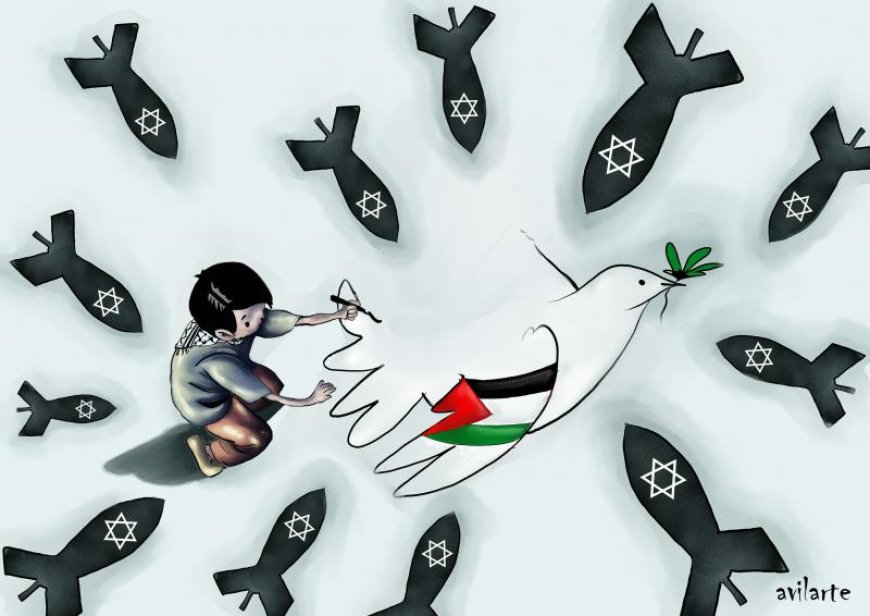Ceasefire Negotiations in Gaza: A Fragile Path Toward Peace or a Temporary Respite?
An official from the Palestinian Islamic Jihad Movement, Hamas, has said international mediators have resumed talks with the Palestinian Liberation Movement and Israel regarding a ceasefire in Gaza.

The resuming of truce negotiations between the Palestinian Liberation Movement, Israel, and international mediators offers a meager prospect for peace as the continuous confrontation between Israel and Gaza approaches its 14th month. On Friday, Hamas spokesman Basem Naim acknowledged that talks aimed at stopping the bloodshed, therefore ending what many consider to be a "genocide," and ensuring the release of Palestinian detainees imprisoned by Israel are once more under way. Notwithstanding these diplomatic initiatives, the road to a long-lasting ceasefire is still difficult since important needs from both sides could ruin chances for peace.
One cannot stress the importance of these talks any more. Over 10,000 Palestinians have been killed and millions have been uprooted since the Israeli military onslaught in Gaza started. From the Israeli side, continuous missile strikes have claimed almost 1,400 fatalities. There is a tremendous human cost on all sides, hence the collapse of these truce negotiations might prolong an even more severe humanitarian disaster.
The Risks of the Talks
Key unsolved concerns from past rounds of negotiations form the center of the present truce negotiations. Regarding the total withdrawal of Israeli forces from Gaza, Palestinians' right to return to their homes, and the release of Palestinian detainees, Hamas is emphatic. These demands are not only symbolic gestures; they are recognized as absolutely vital for the dignity and rights of the Palestinian people, whose suffering and displacement have endured for decades.
Specifically important is the demand for the return of displaced Palestinians. The United Nations Relief and Works Agency (UNRWA) estimates that since the 1967 Six-Day War, over 1.5 million Palestinians have been displaced; many of them currently live in camps spanning Gaza, the West Bank, and neighboring nations. For these individuals, returning to their homes is not only a political matter but also a profoundly emotional and personal one. For Israel, however, such a return is considered as a threat to its demographic balance, so this demand is a main challenge to a long-lasting accord.
The Military Presence: A Principal Object of Interest
Israel's determination on keeping a military presence in important areas—including the Netzarim area and the Philadelphia Line along the Gaza-Egypt border—adds still another crucial problem. Israel's security issues are obvious: it sees the Gaza border as very vital for stopping arms smuggling and limiting Hamas's military capacity. One of the primary sources of contention in the first round of negotiations in August was Israel's will to keep authority over these territories. Palestinians view the ongoing Israeli military presence in these areas as an infringement on their sovereignty, therefore aggravating their animosity and erasing confidence.
Regarding some of these requests, especially on timing of Israeli force withdrawals, Hamas has said it is "ready to soften its stance". Still, such adaptability seems to depend on Israel making significant sacrifices in exchange. Viewing them as vital to its national security, Israel's government, under Prime Minister Benjamin Netanyahu, has shown little inclination to make major concessions on these fronts.
The Difficulties of Belief
The history of broken truce agreements adds to the challenge these negotiations provide. Previous attempts at peace-broking, including the 1993 Oslo Accords, have fallen apart and left both parties suspicious of one another's motives. Furthermore undermining efforts for reconciliation, violence and provocations on the ground have often became more intense following peace negotiations.
60% of Palestinians see Israel's activities in Gaza as part of an ongoing attempt to eradicate their existence and identity, according to a poll taken by the Palestinian Center for Policy and Survey Research in 2023 On the Israeli side, a 2024 poll by the Israel Democracy Institute revealed that 55% of respondents see Hamas as an existential threat, which drives support for military action instead of diplomatic one. These striking variations in view make it abundantly evident that reaching a meaningful ceasefire calls not only political sacrifices but also a change in popular opinion on both sides.
The Human Price and the Road Forward
There is terrible cost associated with ongoing inaction. With basic needs including food, clean water, and medical supplies in limited supply, the United Nations estimates that over 500,000 Palestinians in Gaza require immediate humanitarian aid. Concurrently, the siege of Gaza has limited access to essential resources, therefore aggravating the suffering of people on both sides of the conflict.
Pressures both locally and internationally hamper the discussions as well. Although many people in the world are advocating a stop to the bloodshed, geopolitics is rather important. Key Hamas supporter Iran has cautioned against any attempts to undermine the group, while the United States has stayed a strong friend of Israel offering both military and diplomatic backing. These outside elements often disrupt the nature of the discussions and make it challenging for both sides to reach an agreement that meets their foreign supporters.
Ultimately: A Weak Hope
Although the return of ceasefire negotiations is encouraging, the chances for a long-lasting peace remain hazy. Deeply ingrained in their own national narratives and security issues are the expectations from both Israel and Hamas. The failure of past peace initiatives and the continuous bloodshed on the ground underline the frailty of these conversations even when foreign mediators are laboring nonstop to heal the gulf.
The international community has to advocate for a thorough solution covering both the urgent humanitarian catastrophe and the fundamental political concerns as the talks go on. Without real compromise and a long-term vision for peace, the ceasefire negotiations could only offer a fleeting solace rather than the enduring peace both Palestinians and Israelis so sorely need. The world has to pay great attention since the result of these negotiations will affect the area as well as the direction of world diplomacy in conflict areas.













































